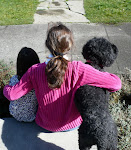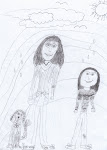
She came home last Wednesday, dumped her backpack in the hall, hugged me, and headed to the kitchen for a late afternoon snack and the day’s debriefing.
I tried out for Bump today, Mom.
It’s mid-May. There are four weeks left in the school year. She’s been shooting baskets every day, every recess, alone in a corner of the playground since early last fall.
What do you mean... tried out? I asked.
At the start of the school year, she and her classmates played nothing but Four-Square. Then, for a change, they played Nine-Square. They played before school, during school (at recess,) and after school. My daughter loved it. Then, for some reason, or perhaps no reason, somewhere around mid-October, the kids all switched to a game called Bump. They lined up on the basketball court, and took turns shooting baskets. If you took a turn and missed, you could still use your ball to try and bump the next person’s shot away.
More and more it seemed, when I asked about her day, about what happened at recess, she chose to go it alone. She wasn’t joining in the other kids’ games, and she sat alone at lunch. This wasn’t like her. She loved to be in the thick of things, to play with the other kids.
There was a lot going on last fall. I’d been warned third grade wasn’t always smooth sailing, that the waters could be choppy.

One boy in her class prodded and teased her relentlessly. Like an awkward, St. Bernard puppy, all elbows and feet, he was accustomed to rougher play, to an older brother’s jostling and teasing. He was sweet, but he was also obtuse. He couldn’t read my daughter’s upset, her non-verbal cues.
One day in the lunchroom another girl from her class attempted a clumsy power play. She whispered to a cluster of girls, suggesting my daughter was mean. The good news? The girls looked at Presumptive-Ring-Leader-Girl as if she were crazy. The bad news? My daughter, sitting one table away, alone with her lunch, heard the exchange.
Another girl, needy and anxious, not knowing a better way, fought for friends, position, or playground advantage using pressure, coercion, exclusion, and threats. It’s not fair! she would cry. You’re mean! I’m telling! The girl wouldn’t take no for an answer. Not knowing how to respond, not wanting to create further conflict, my daughter gave in. This only made her more of a target. She ended up odd girl out, squeezed out of play, even friendships.
At school, she retreated to the safety of the Sad Froggy Desk, in tears. At home, she retreated to the couch, in tears. I sat with her, listened, asked questions. I tried humor. We brainstormed solutions and role played. Slowly she learned to distinguish between accusation and reality, between forceful threat and meaningless bluster. Between coercion and friendship.
Be yourself, I said. Follow the Golden Rule. Remember, what goes around, comes around.
We cycled through the same conversations over and over. For weeks this consumed the bulk of our evenings.
She had good days and bad but finally, slowly, she began to bounce back. The boy who’d been jostling and teasing stepped into her crosshairs one time too many. She looked him in the eye just as we’d practiced. She called out his name then, staring him down, said firmly and clearly, I don’t like that. Please stop it.” The boy froze in his tracks and nearly fell over. But the teasing and jostling stopped.
Soon too, she was on good enough terms with Presumptive-Ring-Leader-Girl. And she stood her ground with Needy-and-Anxious. I'm not mean, she countered. Maybe you’re the one who's mean. If you don’t like what we’re doing, sit some place else.
The tears and upset diminished. Still, she spent much of her free time, at lunch, on the playground, alone. She sat apart and played apart. Then, this spring, a new wave of sadness on a different front: the loss of her birth mother, her country and culture. I wondered if the year was all just too much, if it was taking a toll on her self-esteem. But I knew too much outward worry would make matters worse. So I watched and I waited.
I stopped by school one day to drop off some papers and decided to take a look for myself. I snuck a peek out at the playground. There were kids everywhere, chasing, racing, swinging, spinning, batting, kicking, climbing, yelling, shooting, shoving, and shouting. I spotted my daughter off on a corner of the black top, apart from her classmates -- an island of calm.
She stood there, holding a basketball.
 The ball looked big, almost a quarter the size of her body. Her little girl hands fanned out, clutching the great orange orb. She looked up at the tall, far away hoop, pulled the ball in close to her chest, then hurled the beast up and out, throwing the full weight of her body behind it, stumbling forward. Sometimes the beast found the basket: Whoosh! More often than not, it didn't. It hit the rim with a dull, resounding thud: Whh-onggg! The backboard shuddered and the ball ricocheted away. She scrambled to rein in the runaway and then she returned. She dribbled. Got back in position. Collected her thoughts, took aim, and hurled the beast again.
The ball looked big, almost a quarter the size of her body. Her little girl hands fanned out, clutching the great orange orb. She looked up at the tall, far away hoop, pulled the ball in close to her chest, then hurled the beast up and out, throwing the full weight of her body behind it, stumbling forward. Sometimes the beast found the basket: Whoosh! More often than not, it didn't. It hit the rim with a dull, resounding thud: Whh-onggg! The backboard shuddered and the ball ricocheted away. She scrambled to rein in the runaway and then she returned. She dribbled. Got back in position. Collected her thoughts, took aim, and hurled the beast again.She was neither sad nor upset. Maybe this wasn’t a bad thing...
A little while later when she mentioned sitting alone in the lunchroom, I asked why she chose not to sit with her friends. If there might be a reason. The answer? The fewer the distractions, the sooner she finished, the greater the chance she’d be out on the court, under a hoop, with a ball.
A few weeks later, she asked if I could find a basketball camp for one of her summer activities.
Did an escape turn into a passion? Or was the passion a healthy escape..?
 The sun shot low beams of light through the panes of our back kitchen door. My daughter sat at the counter, licking her frozen yoghurt. Trying out at Bump, she explained, meant she’d stepped into line along with her classmates to take a turn at the basket.
The sun shot low beams of light through the panes of our back kitchen door. My daughter sat at the counter, licking her frozen yoghurt. Trying out at Bump, she explained, meant she’d stepped into line along with her classmates to take a turn at the basket.What prompted this? I asked.
Turns out, her friends, Emmy, Sarah, and Hannah, had pleaded with her for days, urging her to join them. Come on! Please! Just come! Get in line! So, she stepped into line and when her turn came, she looked up at the hoop, took aim and, thrusting her arms out, propelled the ball up into the air.
And guess what, Mom?
What?
I got it in! I shot a basket! She sprang out of her seat, pumped her fists high in the air, made a "V" with her fingers, and strutted about the kitchen. Kicking her knees up high, she shouted, Oh yeah… oh yeah.. oh yeah… I ROCK!
You sure do, kiddo.
But you know what?
What?
I tried Bump at the beginning of the year and -- she rolled her eyes -- I really sucked!
She cracked up.
That evening, she shared a note she'd received from one of the girls in her class.
Dear _________,
You’re a great friend. You rock! Let’s have a play date.
I looked at my daughter and marveled at her resilience, at how far she'd come. I told her as much, and she beamed.
Thirty minutes later, washed and scrubbed, the two of us settled into my high, four poster bed. Drawing the large comforter up about our chins we sank deeper into the bed. Max burrowed in between the stretch of our bodies. Black patches of curly fur appeared between the excess folds of white cotton cover. His deep measured breathing soon filled the room.
I opened Phantom Tollbooth and picked up where we'd left off. Milo, Tock, and the Humbug had leapt to Conclusions -- but now they made their way back. We lost ourselves in the rhythm of story, the puns, and word play. We peered up at each other with knowing smiles, a shared understanding. The minutes ticked by and we nestled still deeper into the bed. The comforter was so full, so thick, so high, we soon caught only glimpses of each other between the great white, billowy waves. We grew sleepy, drifting along on beautiful, calm, balmy waters. Just us three, on our great white raft.











 Everyone worked. Well, almost everyone. We passed clusters of men in small towns, lingering in pool halls, smoking, loitering in the square, leering as we passed. We noticed more often than not, that women and children worked in the fields. They carried astonishing loads, on heads, shoulders, bikes, and backs, lugging firewood, brush, persimmons, potatoes, hay, and big buckets of water. They smiled as we passed even when their bodies bowed under the loads they bore.
Everyone worked. Well, almost everyone. We passed clusters of men in small towns, lingering in pool halls, smoking, loitering in the square, leering as we passed. We noticed more often than not, that women and children worked in the fields. They carried astonishing loads, on heads, shoulders, bikes, and backs, lugging firewood, brush, persimmons, potatoes, hay, and big buckets of water. They smiled as we passed even when their bodies bowed under the loads they bore.





